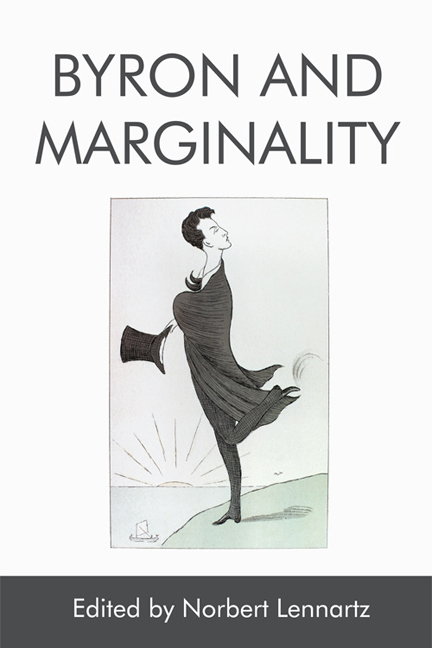Book contents
- Frontmatter
- Contents
- Foreword
- Acknowledgements
- Editions and Abbreviations
- 1 Lord Byron, Wandering and Wavering between the Centres and Margins of Romanticism: An Attempt at an Introduction
- I Byron’s Marginalisation in Romantic World Literature
- II Byron’s Marginal Identities and Places
- III Cherishing the Marginal – Marginal Genres in Byron
- IV On the Provocative Margins of Taste
- V Marginal Affairs – Visual and Paratextual Aspects in Byron
- List of Contributors
- Index
15 - ‘I ask his pardon for a postscript’: Byron’s Epistolary Afterthoughts
Published online by Cambridge University Press: 06 May 2021
- Frontmatter
- Contents
- Foreword
- Acknowledgements
- Editions and Abbreviations
- 1 Lord Byron, Wandering and Wavering between the Centres and Margins of Romanticism: An Attempt at an Introduction
- I Byron’s Marginalisation in Romantic World Literature
- II Byron’s Marginal Identities and Places
- III Cherishing the Marginal – Marginal Genres in Byron
- IV On the Provocative Margins of Taste
- V Marginal Affairs – Visual and Paratextual Aspects in Byron
- List of Contributors
- Index
Summary
It is arguable that Byron's letters and journals have never really been on the fringes or margins of our responses to the poet. Those published, albeit in censored form, in Thomas Moore's Letters and Journals of Lord Byron as early as 1830 made an immediate impression on the reading public. Nevertheless, the two most important twentieth-century critics of Byron's correspondence felt the need to make a case for seeing it as something greater than what Gérard Genette termed an ‘epitext’ – a marginal or supplementary discourse – to the literary works. Leslie Marchand, in the general introduction to his priceless twelve-volume edition of Byron's letters and journals, hoped that his endeavours would prove ‘why Byron's literary reputation will at last rest as much on them as on his poetry’ (BLJ, vol. 1, p. 18). John Jump believed Byron's letters had claim ‘to the kind of attention we normally reserve for more deliberate literary works’. That claim, not one that I wish to dispute here, derives from a series of frequently attested qualities that include Byron's wit, emotional and intellectual frankness, an ability to shift deftly tone and idiom, capriciousness, sincerity and the capacity to entertain or outrage his correspondent. Byron's letters actually fit rather well within Romanticism – and this might be said to make them central, rather than marginal, to it – for the sense of excessive, boundless energy that they often display, even when Byron professes to his correspondent, as he sometimes did, laziness and lassitude, a kind of Romantic overflow of powerful feeling. To this end, Marchand noted the ‘free-flowing and on-rushing style of composition’ (BLJ, vol. 2, p. 6), and Jump the fact that Byron's handwriting – the poet termed it his ‘detestable scrawl’ (BLJ, vol. 4, p. 95) – indicated that he wrote quickly, ‘what comes uppermost at the moment’ (BLJ, vol. 10, p. 33) (sometimes as many as five letters in half an hour, he claimed in a journal entry (BLJ, vol. 8, p. 12)).
These interventions, along with others by Andrew Nicholson, Nina Diakonova and Richard Lansdown, have contributed to the established view that the most attractive quality of Byron's epistolary prose is its spontaneity.
- Type
- Chapter
- Information
- Byron and Marginality , pp. 291 - 307Publisher: Edinburgh University PressPrint publication year: 2018



